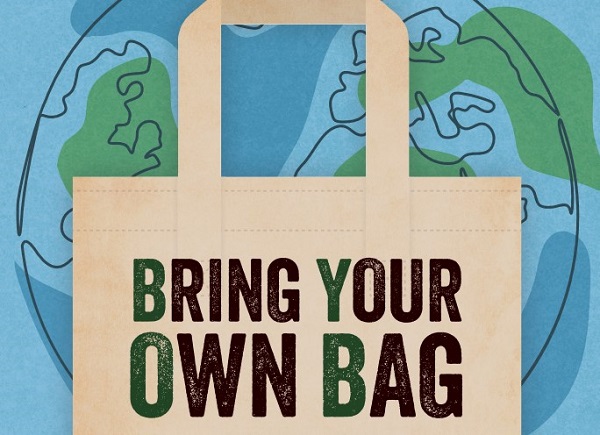TOWSON, MD—Beginning November 1, 2023, Baltimore County will prohibit the distribution of single-use plastic checkout bags at the point of sale and consumers will need to utilize reusable bags.
To assist with the transition, Baltimore County officials will soon offer free reusable bags for residents at all Baltimore County Public Library branches, all Baltimore County senior centers, and community pop-up events at farmers markets across the county.
Bags will be available from Baltimore County government on the following dates and locations:
Catonsville Farmers Market (Sundays, 9 a.m. to 12 p.m.)
Location: 15 Mellor Ave, Catonsville, 21228
- September 24
- October 8
- October 22
Essex Farmers Market (Fridays, 4 p.m. to 7 p.m.)
Location: 500-block of Maryland Ave, Essex, 21221
- Friday, October 6
- Friday, October 20
Towson Farmers Market (Thursdays, 10 a.m. to 3 p.m.)
Location: Allegheny Ave, Towson, 21204
- September 21
- October 5
- October 12
Pikesville Farmers Market (Tuesdays, 2 p.m. to 6 p.m.)
Location: 1700 Reisterstown Rd, Pikesville 21208
- September 26
- October 10
- October 24
Bags will be limited to one per person and will be available on a first-come, first-served basis.
In addition, Baltimore County is providing bags directly to Supplemental Nutrition Assistance Program (SNAP) and Women, Infant and Children (WIC) households.
Opponents of the Bring Your Own Bag Act
More than two-thirds of NottinghamMD.com readers opposed the bag ban. Opponents of the plastic bag ban say the government shouldn’t have a say in what kind of bag shoppers can use at the store.
In addition, opponents say reusable bags can harbor bacteria and viruses and impose undue hardship on local businesses.
- A study by the University of Arizona found that 51% of all reusable bags contained coliform bacteria, and 12% contained E. coli, indicating the presence of fecal matter and other pathogens. The same study found that 97% of individuals admitted that they never washed their reusable bags.
- Harmful bacteria can thrive in reusable bags unless users clean them properly after each use with soapy water that is at least 140 degrees.
- A Canadian study found bacteria build-up on reusable bags was 300% higher than what is considered safe.
- Storing reusable bags in a hot trunk — which many people do — causes the bacteria to grow 10 times faster.
- A study published in the New England Journal of Medicine found that COVID-19 can live up to three days on polypropylene, which is the material that most reusable bags are made of.
- A 2018 study in the Journal of Environmental Health concluded that reusable bags are very effective in transmitting infectious viruses from private homes to supermarket grocery carts and checkout stands.
- In 2013, millions of American piglets died amid an outbreak of novel swine enteric coronavirus disease, and after an investigation the U.S. Department of Agriculture concluded that reusable feed totes were the most likely root cause. The feed bags are often made of the same kind of material as reusable shopping bags (polypropylene).
- In 2010, several Oregon teens and adults fell ill after attending a soccer tournament. Scientists traced the sickness to a reusable grocery bag, “which had been stored in a bathroom used before the outbreak by a person with a norovirus-like illness.”
- California researchers studying the potential of reusable bags to transmit infectious diseases found that a contaminated reusable bag would cross-contaminate any surface it came into contact with, putting nine out of 10 people who go to that grocery store at risk of infection.
Some imported reusable bags have been found to contain toxic lead.
- Lead can cause irreversible damage to the nervous systems and major organs. It inhibits the body’s ability to regulate vitamin D and form red blood cells properly, which can cause seizures, coma, and death. Children can suffer from developmental delay, lower IQ, hyperactivity, learning disabilities, behavioral problems, impaired hearing, and stunted growth.
Regardless, the Bring Your Own Bag Act goes into effect in Baltimore County on November 1st.
Bring Your Own Bag Act Details
In accordance with the Bring Your Own Bag Act, the vast majority of retail establishments must comply with the prohibition of single-use plastic checkout bags. This includes:
- Convenience stores
- Department stores
- Grocery stores
- Hardware and home improvement stores
- Liquor stores
- Pharmacies
- Restaurants
Retail establishments must charge a minimum of $.05 for each paper or reusable bag distributed.
The plastic bag prohibition does not include bags used to:
- Contain produce or bulk foods such as nuts, grains, candy or small hardware items
- Contain or wrap frozen foods, meat, fish, flowers, potted plants or other damp items
- Take live fish, insects, mollusks or crustaceans from a retail establishment
- Contain unwrapped prepared foods or bakery goods
- Comply with food safety and contamination standards
- Contain garments or dry-cleaned clothes
Retailers may offer and promote incentives for customers to bring their own bag, or reduce the cost of purchasing a reusable bag, as long as the fee is no less than five cents per bag.
Resource Toolkit
Local retailers are encouraged to download the following resource artworks for the BYOBag campaign to print and display at their stores:
Exemptions
Exempt locations include small retail establishments (stores, food service facilities, or other establishments that provide carryout bags) that operate solely in Baltimore County or adjoining jurisdictions, and have three or fewer locations and are not part of a franchise corporation, corporate control group or partnership with locations outside of the County and adjoining jurisdictions. This exemption does not apply to liquor stores, convenience stores or fuel or service stations with convenience stores.
Additional information on Baltimore County’s plastic bag ban is available online here.
For additional questions, please contact Baltimore County Code Enforcement at at [email protected] or by calling 410-887-3351.
Do you value local journalism? Support NottinghamMD.com today.

